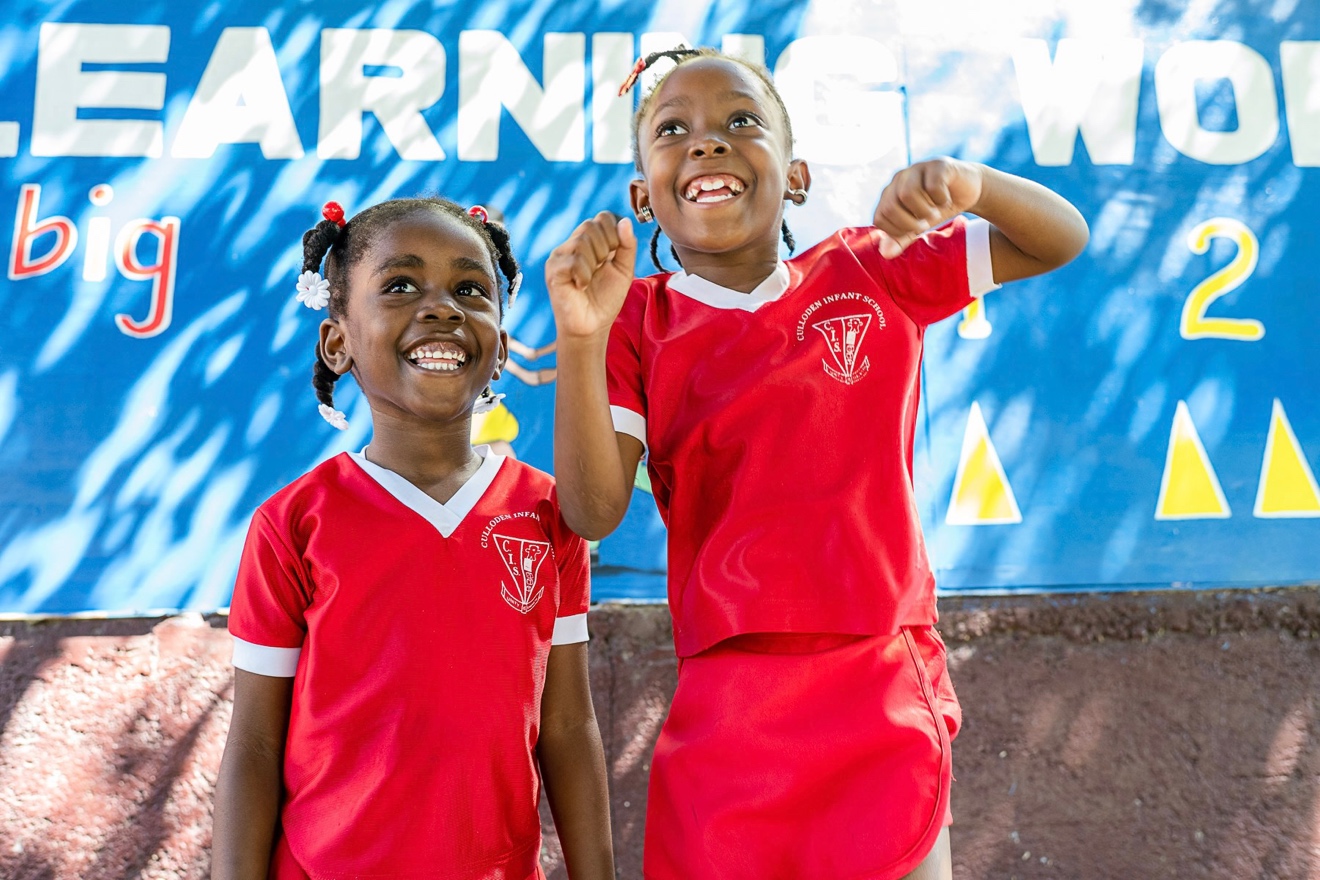Caribbean News
Sandals Resorts Announces 40 for 40 Initiative’ Projects
Published
4 years agoon

~Created with the Sandals Foundation to Celebrate Sandals’ 40th Anniversary, Selected Projects Uplift Communities, Offer Voluntourism Opportunities for Guests~
#Jamaica, March 22, 2022 – In partnership with its philanthropic arm, the not-for-profit Sandals Foundation, Sandals Resorts International (SRI) announces the full list of projects under its 40 for 40 Initiative. Launched as part of Sandals Resorts’ 40th anniversary celebrations, 40 projects were identified across eight Caribbean destinations where SRI operates that best showcase the incredible link between tourism and its power to transform communities and improve local lives.
The 40 for 40 Initiative projects were selected across six areas: preserving natural resources through Conservation Efforts and Tours; Investing in Food Security by supporting and working with local farmers; Hospitality Training and Certification aimed at ensuring ongoing excellence; maintenance of cultural heritage through Support of Local Artisans and Music Education & Entertainment; and bolstering local economies through Small Business and Community Market Support.
Across the Caribbean, SRI team members from Sandals Resorts, Beaches® Resorts and the Sandals Foundation will be rolling up their sleeves to help bring these projects to life. Visiting guests can also support and participate in many of the activities taking place throughout the region.
be rolling up their sleeves to help bring these projects to life. Visiting guests can also support and participate in many of the activities taking place throughout the region.
“Tourism has the power to transform, not only the lives of the guests who immerse themselves in the charm and culture of the Caribbean while on vacation, but for our team members and neighbors who build their families’ roots in the region,” said Adam Stewart, Executive Chairman, Sandals Resorts International and President and Founder of the Sandals Foundation. “This is the important work we build on and celebrate today, as part of our relentless efforts to strengthen the transformative link between tourism and the empowerment of our local Caribbean communities.”
Conservation Efforts and Tours
Through the Sandals Foundation, SRI has made the environment a priority, investing millions in education and advocacy programs, establishing marine sanctuaries, out-planting more than 12,000 corals, and engaging over 55,000 people in conservation efforts. Now, the team will advance its efforts to protect the region’s natural resources by expanding opportunities for marine conservation.
In honor of its late Founder, Chairman and philanthropic stalwart, Gordon “Butch” Stewart, the team has partnered with the Professional Association of Diving Instructors (PADI) to implement its ‘Sea the Legacy of Love’ Scholarship Program. The program will provide 40 Caribbean nationals across six islands with dive certifications from open water to master level. This, together with opportunities for guests to take part in activities such as coral out-planting in Jamaica and St. Lucia, will have a lasting impact on life below the surface.
Additional projects include supporting the Andromeda Gardens, a 6.5-acre botanical garden in Barbados created in the 1950s, and providing funding to assist in the recovery of sand dunes in Lucayan National Park in The Bahamas that were heavily impacted by invasive plants and storm surges.
Investing in Food Security
Together with the Sandals Foundation, SRI, which already sources over 90% of its food supply locally, is ramping up its investment in agriculture and the institutions training the next generation of producers. Various contributions will include equipment donation at the Agriculture Training College in Barbados, construction of hydroponics at Antigua’s Gilbert Agricultural and Rural Development Centre, and establishing community composting practices on-resort. The Foundation will also support the Grenada Network of Rural Women Producers (GRENROP), a group of 65 local women and at-risk youth charting their financial independence through agriculture.
Small Business and Community Market Support
The Sandals Foundation is continuing to invest in local businesses like the Oistins Fish Fry in Barbados, where locals and visitors alike can meet with vendors and enjoy freshly prepared seafood. Guests at Sandals have the opportunity to embark on paid tours that directly support these vendors and their livelihoods.
With establishments such as these accounting for on average 30 percent of its island’s global development product (GDP), the Sandals Foundation is committed to improving the welfare of operators as well as their earning potential by upgrading additional locales such as Cultural Market Place in Turks & Caicos and Pineapple Craft Market in Jamaica. The Sandals Foundation’s community projects are highlighted on resort, inviting guests to support through donations.
Supporting Local Artisans
For years, guests of Sandals and Beaches Resorts have had access to locally made items at its retail shops, proceeds of which are reinvested into local community groups. The Sandals Foundation will expand its hugely successful Caribbean Artisan Program by training more crafts people across more islands including Curaçao, St. Lucia, Bahamas and Turks & Caicos, providing more travelers the opportunity to take home a piece of the region. Sandals and Beaches Resorts guests can also look forward to meeting these craft men and women through pop-up shops on resort and seeing the magic unfold.
Bahamas and Turks & Caicos, providing more travelers the opportunity to take home a piece of the region. Sandals and Beaches Resorts guests can also look forward to meeting these craft men and women through pop-up shops on resort and seeing the magic unfold.
Music Education and Entertainment
From ska and calypso to Jamaica’s iconic reggae and dancehall, the unmistakable soundtrack of the Caribbean keeps visitors coming back and locals moving forward. Together with international partners, high school and college music educators will be trained on key techniques to further develop the region’s iconic sounds. Additionally, the 40 for 40 Initiative will culminate with a musical showcase that brings the magic of Caribbean music to Miami in order to help raise funds for continued growth of the region.
Hospitality Training and Certification
To ensure the continued training of future tourism industry players, the teams at SRI and the Sandals Foundation are supporting hospitality training and certification programs to strengthen vocational skills in the areas of food & beverage, health, beauty, and wellness. In Antigua, trainees can receive a health and beauty certification to gain skills for the fast growing wellness sector. In Exuma and New Providence, the Foundation will assist with year-long programs that supports commercial food preparation.
“We are very excited about these 40 projects of transformation and our role in helping realize the impact tourism makes in the Caribbean,” said Heidi Clarke, Executive Director of the Sandals Foundation. “Tourism touches almost every corner of local communities and we are fully appreciative of its ability to make a real difference. We are extremely grateful to every guest, team member, partner, travel advisor, donor and supporter who have volunteered or supported our work to improve literacy, healthcare, youth engagement and the many areas in which we focus. Together with our SRI teammates, we will continue to use the power of tourism to bring lasting change,” said Clarke.
Celebrating its 13th anniversary on March 18th, since its inception in 2009, the Sandals Foundation has implemented projects and programs valued at nearly US $79 million, touching the lives of more than 1.1 million people.
For a complete list of 40 for 40 Initiative projects, visit: https://news.sandals.com/article/1629/.
For more information about the Sandals Foundation and to donate, visit: https://sandalsfoundation.org.
Press Release: Sandals Resorts
You may like
-


Sandals Resorts and Beaches Resorts celebrate a night of wins, and take home a total of 16 titles at the 32nd Annual World Travel Awards
-


Sandals Resorts Awarded CARPHA’s Highest Health and Safety Honour
-


Teachers Feted by Sandals Resorts International
-


BEACHES® RESORTS ANNOUNCES NEARLY US $1B IN EXPANSION PLANS FOR ITS PREMIER FAMILY TRAVEL BRAND
-


Over 200 Police Officers Complete Landmark Sandals Corporate University Leadership Training
-


Sandals Corporate University Signs MOU with prestigious Toronto Metropolitan University
Caribbean News
Seven Days. Seven Nations. One Storm — Hurricane Melissa
Published
2 months agoon
November 1, 2025
A week of wind, water, and heartbreak
From Haiti’s hillsides to Bermuda’s reefs, seven Caribbean nations have been battered, bruised, and forever marked by Hurricane Melissa — a storm that tested not only the region’s infrastructure but its unshakable spirit of unity.
Saturday–Sunday, October 25–26 – The First Strike: Hispaniola
Before the storm even earned its name, torrential rain and flash floods swept across Haiti and the Dominican Republic, claiming lives and tearing through rural communities.
tearing through rural communities.
In southern Haiti, rivers burst their banks, swallowing roads and homes; 23 people were confirmed dead by Sunday evening. Across the border, one death was reported in the Dominican Republic as swollen rivers cut off villages in Barahona and Pedernales.
By nightfall, the tropical system had strengthened — and the Caribbean knew it was facing something historic.
Monday, October 27 – Evacuations and Airlifts
In The Bahamas, Prime Minister Philip Davis issued a mandatory evacuation for the MICAL Islands — Mayaguana, Inagua, Crooked Island, Acklins, Long Cay, and Ragged Island.
Bahamasair added extra flights as the nation braced for what forecasters warned could become the strongest storm in nearly two decades.
Meanwhile, Jamaica, Turks & Caicos, and Cuba activated their national emergency operations centers.
Tuesday, October 28 – Jamaica and Haiti Hit Hard
By afternoon, Hurricane Melissa made landfall near St Elizabeth, Jamaica, as a Category 5 hurricane — winds of 185 mph, central pressure 892 mb, the lowest ever recorded so close to the island.
Roads collapsed, bridges washed away, and Black River Hospital lost its roof. Power failed for 72 percent of the island.
BOJ TV footage shows split asphalt, sparking lines, and flooded communities abandoned for safety.
Initially four were reported dead, that grew to seven deaths and heavy damage in 170 communities; Andrew Holness, Jamaican Prime Minister calling it “a national test of resilience.”
Haiti, still recovering from the weekend’s flooding, was hit again as outer bands dumped more rain on Les Cayes and Jacmel, deepening the humanitarian crisis.
Wednesday, October 29 – Crossing to Cuba
Weakened slightly to Category 4 (145 mph), Melissa tracked north-northeast at 8 mph, hammering eastern Cuba with hurricane-force winds
and mudslides. Over 15 000 people were evacuated from Santiago de Cuba and Holguín.
In Turks & Caicos, the Regiment deployed to Grand Turk, Salt Cay, South, North and Middle Caicos, preparing shelters and securing public buildings.
Thursday, October 30 – The Bahamas and the All Clear
Melissa’s speed increased, sparing the northern Caribbean its worst.
The Bahamas Airport Authority closed 13 airports from Mayaguana to Exuma International; none reported casualties, though infrastructure suffered.
In Turks & Caicos, the all-clear came early Thursday after minimal impact. Premier Washington Misick expressed gratitude and pledged support for neighbors:
“We must act — not only with words, but with compassion and deeds.”
Friday, October 31 – Counting the Cost
By Friday, Melissa had weakened to Category 3 (120 mph) north of Cuba.
The Bahamas Department of Meteorology issued its final alert, lifting warnings for the southern islands.
Regional toll:
- Haiti: 23 dead, thousands displaced.
- Jamaica: 7 dead, 170 communities damaged; 72% without electricity
- Cuba: 2 dead, 15, 000 evacuated.
- Dominican Republic: 1 dead, flooding in southwest.
- Bahamas: 0 dead, minor infrastructure damage and flooding in southeast.
- Turks & Caicos: minimal to no impact.
Relief and Reconnection
The Cayman Islands became the first government to touch down in Jamaica post-storm. Premier Juliana O’Connor-Connolly led a contingent bringing a plane-load of essentials and pledged US $1.2 million in aid.
Reggae icon Shaggy arrived on a private jet with friends, delivering food, medical kits, and hygiene supplies.
Meanwhile, Starlink and FLOW Jamaica activated emergency satellite internet across Jamaica providing free connectivity through November.
From overseas, U.S. President Donald Trump, speaking during his Asia tour, announced that American search-and-rescue teams and disaster aid will support the region.
“They can depend on U.S. assistance as they recover from this historic storm,” he said.
Faith, Funds, and False Websites
The Government of Jamaica and the Sandals Foundation have both launched verified donation portals for recovery. Officials are warning against fake crowdfunding pages posing as relief sites and urging donors to use only official channels.
A Seventh Nation in the Crosshairs – Bermuda
As Hurricane Melissa left the Caribbean basin, Bermuda found itself next in line.
Forecasts indicated the storm would pass just west of the island late Thursday into Friday, likely as a Category 1 to 2 hurricane with sustained winds near 105 mph.
Though far weaker than when it ravaged Jamaica, officials issued a hurricane warning, urging residents to secure property and expect tropical-storm conditions.
By all appearances Bermuda is heeding the warnings
The Human Response
Across the Caribbean, solidarity surged.
The Global Empowerment Mission (GEM) in Miami began airlifting relief supplies, while churches, civic groups, and businesses in The Bahamas and Turks & Caicos organized drives for displaced families.
“Your dedication gave our islands the strength to face the storm,” Premier Misick said. “Together, as one Caribbean family, we will rise stronger.”
Resilience in the Wake
Melissa’s winds may have faded, but her impact endures. Engineers are inspecting bridges, hillsides, and water systems; volunteers are clearing debris and distributing aid in communities still cut off.
From Haiti’s ravaged river valleys to Jamaica’s sugar towns, from Cuba’s eastern hills to The Bahamas’ salt ponds and Bermuda’s reefs, the region once again stands at the crossroads of ruin and renewal — and leans, as always, toward hope and a faithful God
Caribbean News
Haitian Pushback Halts Controversial Constitution Rewrite — What’s Next?
Published
3 months agoon
October 15, 2025
Deandrea Hamilton | Editor
Haitian media, legal scholars and civic voices did what bullets and barricades couldn’t: they stopped a sweeping constitutional overhaul widely branded as anti-democratic. Editorials and analyses tore into proposals to abolish the Senate, scrap the prime minister, shift to one-round presidential elections, expand presidential power, and open high office to dual-nationals—a package critics said would hard-wire dominance into the executive at a moment of near-lawless insecurity.
The Venice Commission—Europe’s top constitutional advisory body—didn’t mince words either. In a formal opinion requested by Haiti’s provisional electoral authorities, it pressed for clear legal safeguards and credible conditions before any referendum, including measures to prevent gang interference in the electoral process—an implicit rebuke of pushing a foundational rewrite amid a security collapse.
Facing that drumbeat, Haiti’s Transitional Presidential Council has now formally ended the constitutional-reform initiative. The decision, taken at a Council of Ministers meeting at the National Palace, effectively aborts the rewrite track that has haunted Haiti since the Moïse and Henry eras.
So what now? Per the Miami Herald, the pivot is back to basics: security first, elections next. That means stabilizing Port-au-Prince enough to run a vote, rebuilding the electoral timetable, and empowering the provisional electoral machinery—none of which is simple when gangs control vast chunks of the capital and state authority remains fragile. Recent headlines underline the risk: gunfire has disrupted top-level government meetings, a visceral reminder that constitutional theory means little without territorial control.
Bottom line: Haitian journalists and public intellectuals helped slam the brakes on a high-stakes centralization of power that lacked legitimacy and safe conditions. International constitutional experts added weight, and the transition authorities finally conceded reality. Now the fight shifts to making an election possible—clean rolls, secure polling, and credible oversight—under circumstances that are still hostile to democracy. If the state can’t guarantee basic safety, any ballot is theater. If it can, shelving the rewrite may prove the first real step back toward consent of the governed.
Caribbean News
Political Theatre? Caribbean Parliamentarians Walk Out on House Speaker
Published
3 months agoon
October 14, 2025
By Deandrea Hamilton | Magnetic Media
October 14, 2025 – It’s being called political theatre — but for citizens, constitutional watchdogs, and democracy advocates across the Caribbean, it feels far more serious. Within a single week, two national parliaments — in Trinidad and Tobago and St. Kitts and Nevis — descended into turmoil as opposition members stormed out in protest, accusing their Speakers of bias, overreach, and abuse of parliamentary procedure.
For observers, the walkouts signal a deeper problem: erosion of trust in the very institutions meant to safeguard democracy. When Speakers are viewed as political enforcers instead of neutral referees, parliaments stop functioning as chambers of debate and start performing as stages for power and spectacle — with citizens left wondering who, if anyone, is still accountable.
October 6: St. Kitts Parliament Erupts
The first walkout erupted in Basseterre on October 6, 2025, when Dr. Timothy Harris, former Prime Minister and now Opposition Leader, led his team out of the St. Kitts and Nevis National Assembly in a protest that stunned the chamber.
led his team out of the St. Kitts and Nevis National Assembly in a protest that stunned the chamber.
The flashpoint came as the Speaker moved to approve more than three years’ worth of unratified parliamentary minutes in one sitting — covering 27 meetings and three national budgets — without individual review or debate.
Dr. Harris called the move “a flagrant breach of the Constitution and parliamentary tradition,” warning that the practice undermines transparency and accountability. “No serious parliament can go years without approving a single set of minutes,” he said after exiting the chamber.
The Speaker defended the decision as administrative housekeeping, but critics were unconvinced, branding the move a “world record disgrace.” The opposition’s walkout triggered renewed calls for the Speaker’s resignation and sparked a wider public discussion about record-keeping, accountability, and respect for parliamentary norms in St. Kitts and Nevis.
October 10: Trinidad Opposition Follows Suit
Four days later, on October 10, 2025, the Opposition United National Congress (UNC) in Trinidad and Tobago staged its own walkout from the House of Representatives in Port of Spain.
The UNC accused the Speaker of partisan bias, claiming she had repeatedly blocked urgent questions, ignored points of order, and allowed government members to breach standing orders without consequence.
“The Speaker has failed in her duty to act impartially,” the Opposition declared in a statement. “Parliament is not the property of any political party or Presiding Officer.”
The dramatic exit was seen as a culmination of months of rising tension and frustration, with opposition MPs arguing that parliamentary rules were being selectively applied to silence dissenting voices.
Political analyst Dr. Marcia Ferdinand described the twin walkouts as “a warning sign that parliamentary democracy in the Caribbean is teetering on the edge of performative politics.”
“When chairs become political shields rather than constitutional referees,” she said, “democracy becomes theatre, not governance.”
A Pattern Emerging
While St. Kitts and Trinidad are very different political environments, both incidents point to the same regional fault line: the perception that Speakers — the guardians of parliamentary order — are no longer impartial.
In Westminster-style systems like those across the Caribbean, the Speaker’s authority depends not on power but on public confidence in fairness. Once that credibility erodes, parliamentary control collapses into confrontation.
Governance experts say the implications are serious: eroded trust between government and opposition, declining public confidence in state institutions, and growing voter cynicism that “rules” are flexible tools of political advantage.
Why It Matters
Parliamentary walkouts are not new in the Caribbean, but what makes these recent events different is their frequency and intensity — and the regional echo they’ve created. Social media has amplified images of lawmakers storming out, with citizens from Barbados to Belize questioning whether the same erosion of decorum could be happening in their own legislatures.
the regional echo they’ve created. Social media has amplified images of lawmakers storming out, with citizens from Barbados to Belize questioning whether the same erosion of decorum could be happening in their own legislatures.
Analysts warn that if this perception takes hold, it risks diminishing the moral authority of parliamentary democracy itself.
“Once opposition MPs believe the rules are rigged, and once citizens believe Parliament is just performance,” said one Caribbean governance researcher, “you’ve lost the most valuable currency in democracy — trust.”
Restoring Balance
Political reformers across the region are calling for tighter Standing Order enforcement, independent parliamentary service commissions, and training to strengthen Speaker neutrality. Civil society leaders say the public must also play its part by demanding transparency and refusing to normalize partisan manipulation of parliamentary procedure.
Whether these twin walkouts become catalysts for reform — or simply another episode of Caribbean political theatre — will depend on what happens next inside those chambers.
For now, democracy watchers agree on one thing: when opposition leaders feel the only way to be heard is to walk out, the entire democratic house — not just its Speaker — is in danger of collapse.
Angle by Deandrea Hamilton. Built with ChatGPT (AI). Magnetic Media — CAPTURING LIFE.






